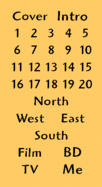© Bettina Rheims for the album cover photo.
© Bernard Lavilliers/Pascal Arroyo/François Bréant/Barclay for the music (excerpt).
© Per A.J. Andersson for the text. Written April 2004, updated November 2011.

État
d'urgence
by Bernard Lavilliers
| "État d'urgence" was a hard-hitting album. It highlighted the rock part of his music, featuring his usual group and presenting tight percussions and powerful guitar play. The voice of Bernard himself shouts out the agony and despair, the "urgency" of the matters at hand. When all dust has settled, maybe it can be regarded as the album from Bernard Lavilliers. — • — Now it's true this Frenchman, born 1946 as Bernard Ouillon, hasn't set much dust in motion in the English-speaking world. Which is why he never became a name outside of the "Hexagon". But in other circumstances (read: singing in English) he could surely have been one. Bernard Ouillon grew up in the industrial town of Saint-Étienne, the son of a metal working father and a teaching mother. The sickly child spent much of his childhood battling with pneumonia. Bernard found himself a loner, got into trouble with the law and spent some time at a borstal. He fostered a deep desire to revolt against society and became an enthusiastic member of a local boxing club. But Bernard also found refuge in music. While serving an apprenticeship at his father's factory, he was busy writing songs and singing in local bars at night. The poetry of musical rebel Léo Ferré was already a large source of inspiration, soon to be joined by the youngster's travels abroad. — • — At the age of 19, Bernard Ouillon was caught by wanderlust, packed his bags and left the grey Saint-Étienne for a decidedly more sunny Brazil. Far from being the Eldorado he had looked for, Bernard nevertheless there for a year and a half, finding job as a lorry driver in the northern parts of the country. Eventually he came back to France, only to discover he was sought after by the government for avoiding the military service. After having served his time incarcerated, Bernard returned to the streets a dedicated protest singer-songwriter and joined the cabaret circuit in Paris at the end of 1967. The young singer was 'discovered' by the artistic director of the Decca label, and he got a record deal. Two singles and an album were released, heavily influenced by Ferré and presented via his nom de plume Lavilliers (Decca didn't think the artist name Ouillon could sell them any records). But back in his mind he also brought with him his experiences from Brazil that was to form his whole career. Bernard continued performing his own songs, mainly solo and with his acoustic guitar as sole aid. Slowly but surely he got his career off the ground, heavily supported by his second wife, Evelyne (he have had two children with her and two more children with other women, a result of the hard times having to live with a restless traveller). In 1972 his second album followed, in 1975 his third. — • — This third album presented the "spoken samba" of "San Salvador" and established the Lavilliers reputation as an exotic adventurer cum gifted singer-songwriter. The following year, the more rock-based album "Les barbares" revealed a socially committed singer as well. He was continually expanding his notoriety as a concert artist, and in the years to come repeatedly sold out large Paris venues such as Olympia and Palais des Sports. Bernard now surrounded himself with a regular group of musicians, with names such as Mahut, Arroyo and Bréant. And the "Lavilliers style" was complete, with rebellious poetry, Latino rhythms and a strong sense of social commitment to his belt. Think French chanson in the hands of a Brazil-flavoured protest singer, performing as passionate as ever Bruce Springsteen. Maybe you get the idea. Bernard Lavilliers has, for lots of years now, been a very special part of French music. Probably the most successful period in his career came in the early 80s, when his records also began turning up in music shops around Europe. From a visit to Jamaica came inspiration to "O Gringo", producing a string of hit singles in 1980. The year after the more somber and elegant "Nuit d'amour" - recorded in Los Angeles and Paris - was awarded by l'Académie du Disque Français. And in 1983 came the powerful and dynamic "État d'urgence"... — • — This record was centered around the dark sides of big city life, the cold streets and hard shadows cast - in New York, Las Vegas, Paris... The music calls out for immediate attention, even with the few songs that brings forth Bernard's usual "brasileiro" themes. The greatest hit from the album was "Idées noires", a duet with singer Nicoletta. The most globe-trotting of French artists, Bernard Lavilliers continued to use the travels as inspiration for his records. "Voleur de feu" (1986) had both African and Brazilian colours, "If" (1988) included traces from Central-American visits, and "Solo" (1991) was made following travels in Asia. Now in his 50s Bernard Lavilliers has continued to be engaged, angry and rebellious, keeping to his musical style. He still wears an earring in his right ear, a symbol of his independent, Corto Maltese-like wanderer-style (only that Corto has the ring in his _left_ ear!). As an hommage to Hugo Pratt's famous comic strip character (whose literary life began in 1967, the same year Bernard released his first record!) Bernard 1979 named his newly bought sailing ship "Corto Maltese"... // |
|
ÉTAT
D'URGENCE |
• If (1988) |

